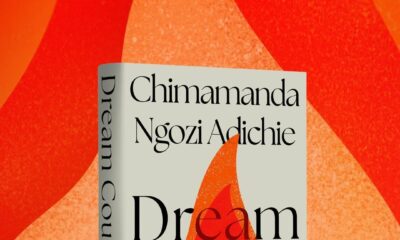Features
BN Prose: Bananas to Feed the Crowd by Feyisayo Anjorin
 My grandfather was our village’s chief of mysteries for many years before he joined his ancestors, leaving me with a chest of wisdom locked up in my body, deep within my bones.
My grandfather was our village’s chief of mysteries for many years before he joined his ancestors, leaving me with a chest of wisdom locked up in my body, deep within my bones.
Now don’t start patting your head like you did the very first time you had a sip of Paraga because of my words.
What I’m trying to tell you is that Pa Fakunle taught me a lot of things I wouldn’t have known early in life; things a lot of unfortunate people would never know till it gets too late to be useful.
One Monday morning I had visited my grandfather in his house in Akure’s East end – in the thick forests at the edge of the airport – because I needed to explore the forests for some leaves and tree barks that I would need for the agbo jedi I was preparing at that time.
When I knocked on the front door and opened it Pa Fakunle was in the sitting room, reading the day’s edition of Salone Daily Times, a special edition on Gulungulun.
The TV was on: The recently concluded election had brought in a new government. It was victory for the opposition, the defeat of an incumbent; it was a sad end for the era of the black fedora.
A man with white beard was in the studio with the host of the programme – a woman who calls her Yoruba name like an English name – talking about a fresh sense of discipline the president-elect would bring to governance. Something about the miraculous power of the body language of the president elect.
“Good morning Baba.” I said, hoping he would skip the usual brief lecture on why a proper Yoruba boy should respect elders with a proper greeting.
“Good morning Dayo. You are serious about this agbo jedi thing o. Is your wife saying you are not trying?”
“Baba it is not for me. I’m preparing it for my friend.”
“You don’t have to be shy son. Men do have these issues.”
“I’m not hiding anything sir. It is not for me.”
Pa Fakunle folded the newspaper, placed it on the stool beside him, stood up, and asked me to wait for a few minutes. He was not sure I would wait after I’m done with my herb-gathering quest, so he said to spare a few minutes before I head for the forest.
He stood up, asked me to follow him with a wave of hand, and walked towards the inner rooms.
He stopped at the door of a room I had neither ever seen opened before nor entered. When he opened to the door and walked in I had to ask to be sure I had his permission to follow him.
Look, if you are wise you will be very careful! You won’t just go anywhere because you are free, or rest your eyes on everything that could be seen, or say everything you feel like saying.
When I entered the room I was not surprised by the sight of the things my eyes saw but my mouth would never say. Where do I start? Is it the anjonus? The eboras? The masks of the orishas? The Yorubas would say bi oju ba ri enu adake.
Pa Fakunle told me to wash my eyes with the water from a black pot beside a wall mirror. I knew what could happen after this, so I was not surprised when I saw a loaf of bread in white china on a glass table beside the window.
Pa Fakunle started by telling me what would be in the bread of awon aye that was before me: Some warm kak, some mungun leaves, some painted nuts, a bit of suwegbe attitude Fela Kuti sang about, white sugar, piss, some brown sugomu pills – the sort that typically coats the mouth of our opposition party’s chief spokesperson with a first name similar to the action word of the devil’s chief ministry – , and a whole lot of dry kak.
By the time he started dwelling on the last item he had mentioned – talking about the importance of the kak in the whole process – I was sure no one would ever touch that thing let alone eat it.
“But they do.” Pa Fakunke said with raised eyebrows.
“No one will eat that shit.”
“You’ve eaten that bread before.”
“Never.” I said, shaking my head, frowning as if he was commanding me to eat the bread.
“Yes you have. We all have, until we decided to make a decision on the ones we have eaten.”
“Papa, kak, as in kay hay kay?”
He nodded. “Yes.”
I was sure my grandfather would not make a joke of this sort of thing; but I allowed a tiny bit of ‘what if?’.
“You think I might have eaten it before?”
“You are human Dayo. Every man born of woman, even evil spirits, has taken that kak. That thing works with the brain, a lot of people hardly ever use that; it works with the eye. Many are blind, but a lot more just don’t know what the eyes they have is for.”
“Baba, slow down, you are getting philosophical about the whole thing now. Please, if you are joking about people actually eating that shit, stop now. But if not, this is really gross; how can we stop people from feeding on that kak?”
“Young man, I’m not joking. Do you know one funny thing about this?”
“No I don’t, sir.”
“People love this kak more than every other thing in the world.”
“But what about Americans? What about white people? What about enlightened ones, the so-called guardians of civilisation?”
He he he he he, the old man laughed in that mechanical way that I hated so much but have come to accept as one of the peculiarities of other people that should be accepted in the spirit of tolerance.
“Americans love this thing, I tell you.”
“They do?”
“You will see, my son. You will soon see. The era of the black fedora just ended, Americans will go to the polls soon. They get the bread from us. What the whole nation will eat, they get it from here.”
I had to take my eyes away from the bread. “Papa, what are you talking about? Who are the us that supplies the bread?”
“Awon aye na ni.” Pa Fakunle replied, taking me through the whole process of mixing the ingredients.
When he was through I asked him about the post-black-fedora era.
“Things will change.” He said.
“That’s what they said.” I said.
“The chief spokesperson of the opposition party will become the new government’s chief spokesperson.”
“Obviously.”
“And then after over three years of suffering and smiling people will be called upon to come for another round of this bread, so that the bad guys can please themselves for another four years.”
“Will they succeed?”
“Look my son,” My grandfather said and I saw his love for me in the glassy sheen of his eyes. “Democracy is about the crowd, and crowds are easy to fool. It’s a monkey-see-monkey-do thing. And these crooks in agbada have a plantation of bananas to feed the crowd.”
That day, I saw truth, I tasted truth, I felt truth. It was like a blinding light, it was bitter like ewuro leaves, it was like the wind.
I wiped tears from my eyes with the back of my hand, bit my lip and tried to hide my face from Papa.
“You can only save yourself son. I brought you in here to teach you how to identify this kak, so that you will never eat it again. Ever. Let the foolish cling to their foolishness. You, learn wisdom.”
Photo Credit: Dreamstime




















